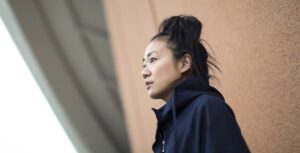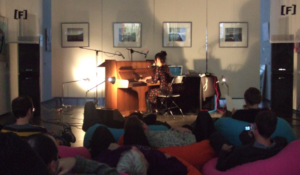Interview Series: [F]luisteren with Midori Hirano
[F]luister is excited to present a series of musician interviews, creating a channel for the continuous communication between musicians and audiences, and promoting a deeper understanding of music and discovering of new music/musicians. And we are happy to introduce the featured musician, Midori Hirano for our first interview.
“I somehow feel like a part of the family of Fluister through music”

(Picture 1) Midori Hirano, photo provided by Midori
In late 2007, Fluister discovered Midori Hirano performing live with her band in a cozy club downtown Kyoto in Japan. She was playing some tracks from her debut album ‘LushRush'(Noble label). She blended electronics, classical melodies, and piano infused indie-pop, it was a beautiful set. Little did we know at that time, that even though we didn’t chat on that day, we would have been building up a friendship over last 16 years and Midori regularly returned to Dordrecht, Fluister show.
Sunday, 9th of June 2024, Midori Hirano will grace the stage at Fluister again. Prior to the performance, Fluister spoke with Midori about Dordrecht, Fluister, her works and coming plans.
Fluister(F): You’ve been a recurring performer at the Fluister show in Dordrecht, now on its your 3rd show. How would you describe your ongoing relationship with the Fluister platform and the audience there?
Midori(M): I’ve known you – Fluister – for almost 16 years now, so I think it’s fair to say that we are good old friends. I really appreciate the enthusiasm dedicated to music by the team Fluister, giving musicians this platform to play in small but nice, cosy venues with friendly audiences, while introducing us to the city of Dordrecht.
It was in November 2008, when I played at Fluister for the first time – It was right after when I moved to Berlin from Japan and my former label mate Kazumasa Hashimoto on Noble label and I were touring in Europe together with the label owner, Junji Kubo. Fluister had set up a show for us at the art centre CBK(Centrum Beeldende Kunst, *now SBK) Dordrecht, filled with big cushion chairs that could offer the audience a comfortable place to listen to the music or even to sleep.
And I remember that Fluister took us to the nice old café to eat the dutch sweets ‘Poffertjes’ after the soundcheck. Friendly & nice hospitality and delicious Korean food are big part of Fluister. I always enjoy spending time in Dordrecht with you all. And as I’ve been recurring to Dordrecht over the many years, I’ve seen Fluister growing as a family too. So I somehow feel like a part of the family of Fluister through music.
(Picture 2) Midori Hirano at Fluister in 2008 at art centre CBK, Dordrecht, Photo by Fluister.
F: Let’s dive into your music showcase on ‘Fluister’ on 9th of June. What kind of sonic journey can listeners expect from your performance?
M: As my release catalogue has been growing over the past few years, I’ll be playing some tracks from the each of my previous albums – for example, ‘Minor Planet’ and ‘Invisible Island’, which I released on Sonic Pieces in 2016 and 2020, and also ‘Soniscope’ on Dauw in 2021. But since I’ll be playing at the 10th anniversary show of Dauw in Ghent a couple of days before the show in Dordrecht, I’ll be playing mostly the pieces from ‘Soniscope’, which I think focuses more on the traditional style of piano playing with less spacey sound effects, than the other more ambient pieces.
F: Can you describe your creative process when writing new music? Where do you draw inspiration from for your music?
M: I often get inspirations by improvising with instruments – by hitting some chords on the keys, not only on a piano but also on synthesizers. I try to record some takes and pick out some parts that I like or that I think have some potential to develop, and then I add more sounds on top of that as a base for the track.
F: The fact that you moved from Japan to Europe is influenced on your composing?
M: I think yes – I can’t say how exactly it has influenced, because I think my composing skill in general has been developed over the years. But I think I was too stuck in the “this is how it has to be mould” when it came to wring pieces before moving to Berlin. Perhaps this had just something to do with my personality and how I grew up.
But I’m sure that living in Europe has allowed me to be more free in my approach to composing and performing, thanks to Berlin where you can experience a lot of underground music events every week.
But this is not only because of the music scene here – If you grow up in Japan as a woman, you sometimes feel that people around you have implanted in you the image that because you are a woman, you are going to be this way, then you have to behave this way. At least that’s how I have experienced it. And I wanted to get out of that somehow.
F: As an artist performing under two distinct names, Midori Hirano and MimiCof, What is the meaning of your artist name of MimiCof? How do the musical identities of Midori Hirano and MimiCof differ, and do they influence each other’s creative outputs?
MimiCof has no specific meaning – This sounds boring but I just wanted to have a name starting with M, which is also the first letter of my name Midori. ‘Mimi’ means ‘ears’ in Japanese, but basically I just liked the way it sounded. When I made my first MimiCof album ‘RoundSkipper’ in 2011, I thought that it would be better to have a different name for it, as the music became much more electronic than ever before.
Under the name MimiCof, I want to specialise in pure electronic sound without the use of piano or other live instruments, and more of an experimental element of music with less harmony, compared to the music under my own name which focuses on piano.
Sometimes I come to think that I may not need to separate these two projects anymore, because I am aware that the both music cross over from time to time. Maybe I will combine everything into one project in the future, but for now I will still keep these projects separate to keep a sort of drawer for my own musical ideas.
I started playing modular synthesizers in the last few years, and this allows me to explore the synthetic sounds more than before, compared to my early MimiCof stuff which relied heavily on sounds from software. Playing with these modules for a while makes me want to go back again to the piano with a fresh mind. This is how I interact between the two projects.
F: When you’re creating music, what do you consider the most crucial aspect—be it sounds, atmosphere, technique, mastering, design, collaboration, innovation, etc.?
M: Sounds are always the most important aspect of course, but so is technique, including both playing skills and also the knowledge of the gears I use.
All the other aspects are also crucial, but they vary depending on the situation. But the important thing is to make sure that these aspects are well in tune with my own expression.
F: Are there any specific messages or themes you try to convey through your music, the audience recognize?
M: I don’t have any specific messages but I just hope it will give the audience some enjoyment in their lives and be something they will remember from time to time.
F: Your work on Amazon Prime Video Sports documentary about the German National football team during the Qatar World Cup was impactful. How did you get the project? And how did approach composing music for this project, and how does it differ from your usual music-making process?
M: When I had a first meeting with the director, Christian Twente, he said that he didn’t want to make a typical football documentary and thus would like to have my music which he said evokes a lot of emotions but also have different types of music styles. I showed him a lot of different tracks from my catalogue, then he picked out some tracks that he thought were closer to the direction he had in mind for the score.
I really appreciated Christian and his whole team who had a full trust on me. There was really a lot of work, but everything went pleasantly.
And the whole cuts they sent me were already lined up with temporary music as references, which of course helped me a lot to understand quickly what they wanted. I composed nearly 100 tracks including the tracks which were not left to be used in the end. (And they used some licensed tracks too)
Everything needed to be done very quick, but I think I did well under the time pressure. And I even have some personal favourites of my soundtracks. For instance, the team’s meeting part. The cue, you hear in that cut is called ‘Gemeinsam Unterwegs’.
But ‘Wunderkind’ which was scored for the interview cut with Jamal Musiala, is probably my most favourite one and the number is now part of my concert repertoire.
In general, film music has to follow the flow and the atmosphere of the story, so it has to be created under various restrictions, which is different from composing music for myself, where I’m free to create whatever I want. But on the other hand, I can create something that I never made for myself, but that is still be recognisable as my music – so it gives me a chance to discover new possibilities within myself. So I could learn a lot through the process of this scoring project.
F: Lastly, can you share any upcoming projects?
M: I’ve been working on two film scoring projects – one is for a feature film produced internationally and the other for a Japanese documentary. I have also composed some piano pieces with field recordings to be played in the feature film. I’m looking forward to sharing more details about it soon.
Other than that, one collaboration album with Brueder Selke has been done and hopefully it will be released in early next year.
F: Thanks for your time and interview. See you at Fluister
M: Thank you too. I’m looking forward to seeing you at Fluister!
edited by Su-Young Kim
Midori Hirano/MimiCof performances:
June 1, 2024 | Q3Ambient @ Waschhaus (Potsdam, DE) *Midori Hirano
June 6, 2024 | Dauw 10th Anniversary @ Palmarium (Ghent, BE) *Midori Hirano
June 9, 2024 | Fluister (Dordrecht, NL) *Midori Hirano
June 29, 2024 | Media Loca 15th Anniversary – @ Galiläikirche (Berlin, DE) *MimiCof
